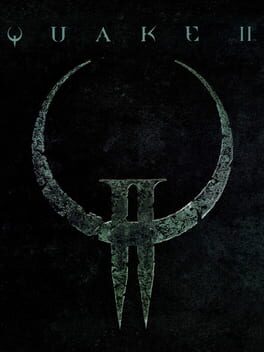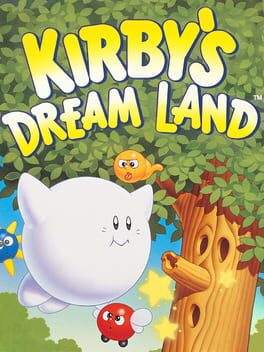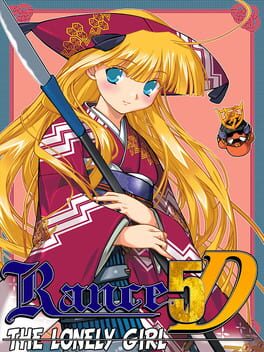Fayacaesu
Bio
insane aesthetic-obsessed zoomer. i value vibes, polish, and narrative highly and will likely have divisive takes among those who enjoy more strictly mechanical or rough experiences, i might also come off as a lil' pretentious but this is just how my brain works
list largely does not include visual novels i have read and i currently do not have a list of dropped games or a proper backlog because i would need to update it every 5 minutes
insane aesthetic-obsessed zoomer. i value vibes, polish, and narrative highly and will likely have divisive takes among those who enjoy more strictly mechanical or rough experiences, i might also come off as a lil' pretentious but this is just how my brain works
list largely does not include visual novels i have read and i currently do not have a list of dropped games or a proper backlog because i would need to update it every 5 minutes
Badges

Liked
Gained 10+ total review likes

2 Years of Service
Being part of the Backloggd community for 2 years

Best Friends
Become mutual friends with at least 3 others

Noticed
Gained 3+ followers
093
Total Games Played
000
Played in 2024
000
Games Backloggd
Recently Reviewed See More
(Star rating is for Call of the Machine; the base game would likely be a 1.5 or a 2)
To this day, I think Doom 1 and 2 are the only truly great games out of id's 90s output (in singleplayer at least; I've heard the Quake games are far better in multiplayer but I can neither confirm nor deny this myself). Wolfenstein 3D and Quake 1 were likely great games upon release (I wasn't alive so I can't really say for sure) and in retrospect they're still technical achievements for the time, but they're also...dated in the present day, for lack of a better term. Wolfenstein is too rudimentary to be anything but a curiosity, and Quake is a drab game that botches the basics of FPS mechanic design. Doom 1 and 2 are polished, imaginative, and frenetic, if imperfect; even when modern boomer shooter designers take influence from other classics, it often feels like the energy they take to their games' pacing is derived from the primordial cultural concept of Doom, and this isn't to mention the thousands of Doom WADs that build upon its structure more directly. Doom is the sort of masterpiece that comes once in a century; to expect id to make a worthy followup to it within the decade would be foolish.
Quake 2 isn't a worthy successor to Doom, but it fills its place in id's legacy well enough. Infamously, it isn't really a successor to Quake either, though I'm apathetic enough towards Quake 1 to not really care. Quake 2 does utterly trounce Quake 1 in terms of mechanical design (having guns and movement that feel good does a lot) and it's a forward-thinking game for 1997; the interconnected levels and objective-based progression prefigure Half-Life from the next year, but the game avoids the more tedious and naturalistic design choices from Valve's seminal title in favor of a more "boomer" arcade sensibility...well, in most regards at least.
Unfortunately, Quake 2 is also a very toothless game, especially compared to the ball-busting difficulty of Doom 2 and Quake 1. The game floods you with resources, and while some of the enemies are kinda annoying, every encounter is pretty easy to cheese. The game introduces an inventory system (which goes against everything Doom and Quake 1 stood for but I digress) but none of the combat-related items are particularly helpful other than for speeding up the process of shredding through enemies like a knife through warm butter, and I forgot they were even there for most of my playthrough. It's a shame, because the game really could've been good; the gunplay and movement is genuinely excellent, and despite my more Luddite views on first-person shooter design I can't deny the possibilities that the engine brings to mapping. Alas, it wasn't meant to be.
Nearly 26 years later, though, Quake 2 did finally reach its potential. With the 2023 remaster came Call of the Machine, developed by MachineGames, and with it I think Quake 2 has finally become an excellent game. While it still doesn't have the elegance or expandability of Doom, it is a mechanically solid game that finally has the confidence to use every mechanic to its fullest and to give the player a meaty, but fair challenge. Elements of crowd control and resource management that felt underutilized in the original campaign are brought into sharp relief, and the maps transport you to their locations in a way that the main game never did. If I could nitpick, I do think this campaign is a bit stingy with health and armor pickups, and the encounter design forcing players into large open spaces makes the grenades feel almost useless. The campaign is also fairly meaty, but it's difficult to shake off the feeling of "wait, was that it?" at the end. You can select areas non-linearly, but the final level unlocked after finishing the first six is just a final boss; it doesn't feel like the difficulty ramps up or the game remixes elements you saw earlier. You just fight a boss and it's over. CotM is meant to be an extra itself, so I can understand it not having a full game arc, but it all just comes across as kind of underwhelming. Regardless, it's excellent, and I think it's worth the price of admission alone.
The remaster also includes both original expansion packs and the unique campaign from the Nintendo 64 version; for people who want more of a Quake 2 fix, these will suffice nicely, but I wasn't too interested in them. From what I played of the first expansion and the N64 campaign, they hew fairly closely to the original game's design philosophy without being as bold as CotM, so if you want to play all the remaster's content, I'd recommend saving CotM for last.
Now, when's the Quake 3 remaster coming?
To this day, I think Doom 1 and 2 are the only truly great games out of id's 90s output (in singleplayer at least; I've heard the Quake games are far better in multiplayer but I can neither confirm nor deny this myself). Wolfenstein 3D and Quake 1 were likely great games upon release (I wasn't alive so I can't really say for sure) and in retrospect they're still technical achievements for the time, but they're also...dated in the present day, for lack of a better term. Wolfenstein is too rudimentary to be anything but a curiosity, and Quake is a drab game that botches the basics of FPS mechanic design. Doom 1 and 2 are polished, imaginative, and frenetic, if imperfect; even when modern boomer shooter designers take influence from other classics, it often feels like the energy they take to their games' pacing is derived from the primordial cultural concept of Doom, and this isn't to mention the thousands of Doom WADs that build upon its structure more directly. Doom is the sort of masterpiece that comes once in a century; to expect id to make a worthy followup to it within the decade would be foolish.
Quake 2 isn't a worthy successor to Doom, but it fills its place in id's legacy well enough. Infamously, it isn't really a successor to Quake either, though I'm apathetic enough towards Quake 1 to not really care. Quake 2 does utterly trounce Quake 1 in terms of mechanical design (having guns and movement that feel good does a lot) and it's a forward-thinking game for 1997; the interconnected levels and objective-based progression prefigure Half-Life from the next year, but the game avoids the more tedious and naturalistic design choices from Valve's seminal title in favor of a more "boomer" arcade sensibility...well, in most regards at least.
Unfortunately, Quake 2 is also a very toothless game, especially compared to the ball-busting difficulty of Doom 2 and Quake 1. The game floods you with resources, and while some of the enemies are kinda annoying, every encounter is pretty easy to cheese. The game introduces an inventory system (which goes against everything Doom and Quake 1 stood for but I digress) but none of the combat-related items are particularly helpful other than for speeding up the process of shredding through enemies like a knife through warm butter, and I forgot they were even there for most of my playthrough. It's a shame, because the game really could've been good; the gunplay and movement is genuinely excellent, and despite my more Luddite views on first-person shooter design I can't deny the possibilities that the engine brings to mapping. Alas, it wasn't meant to be.
Nearly 26 years later, though, Quake 2 did finally reach its potential. With the 2023 remaster came Call of the Machine, developed by MachineGames, and with it I think Quake 2 has finally become an excellent game. While it still doesn't have the elegance or expandability of Doom, it is a mechanically solid game that finally has the confidence to use every mechanic to its fullest and to give the player a meaty, but fair challenge. Elements of crowd control and resource management that felt underutilized in the original campaign are brought into sharp relief, and the maps transport you to their locations in a way that the main game never did. If I could nitpick, I do think this campaign is a bit stingy with health and armor pickups, and the encounter design forcing players into large open spaces makes the grenades feel almost useless. The campaign is also fairly meaty, but it's difficult to shake off the feeling of "wait, was that it?" at the end. You can select areas non-linearly, but the final level unlocked after finishing the first six is just a final boss; it doesn't feel like the difficulty ramps up or the game remixes elements you saw earlier. You just fight a boss and it's over. CotM is meant to be an extra itself, so I can understand it not having a full game arc, but it all just comes across as kind of underwhelming. Regardless, it's excellent, and I think it's worth the price of admission alone.
The remaster also includes both original expansion packs and the unique campaign from the Nintendo 64 version; for people who want more of a Quake 2 fix, these will suffice nicely, but I wasn't too interested in them. From what I played of the first expansion and the N64 campaign, they hew fairly closely to the original game's design philosophy without being as bold as CotM, so if you want to play all the remaster's content, I'd recommend saving CotM for last.
Now, when's the Quake 3 remaster coming?
I've seen some people who consider the original Kirby's Dream Land to be one of the weaker platformers in the pink puffball's catalog, and I couldn't disagree more. It's one of the most impeccably designed action games of the 8-bit era; it's based around a novel concept (swallowing and spitting out enemies) that is explored to its fullest potential across stages that have little to no wasted space or redundancy while continuously guiding the player through setpieces that never interrupt the game flow. It looks and sounds excellent and distinct, and upon beating the game you can replay it with more challenging obstacles and bosses, along with being able to perform challenge runs, and the incredibly short length guarantees that, no matter how many times you replay it, it'll never get tedious. Sure, later games would introduce far more depth with copy abilities and collectibles and grandiose adventures, but taken on its own instead of in relation to the games from Adventure onwards, Dream Land 1 is still a tight and polished experience that I could recommend to anyone even 30 years after its initial release.
Honestly, not that bad. Is this game an unending RNG spam simulator? Yes, very much so. But given a bit of perseverance and possibly some outside help it's not really painful in any way; it's a brisk game with a short runtime that keeps the gears in your head turning, and the RNG acts more as a spice than a wall or a serious obstacle for the most part. If you want an epic traditional RPG then yeah, you're better off playing Rance VI, but if you're okay with a game that pushes the envelope and tries for more experimental design, this is a thoroughly entertaining time.


